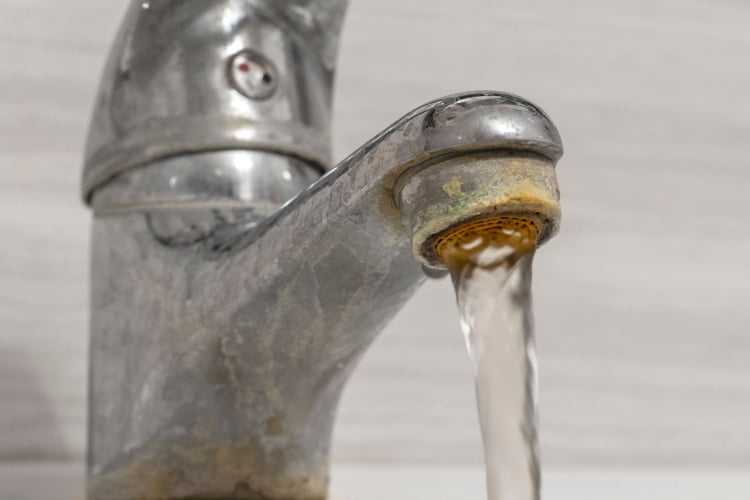Well water is typically hard, but the hardness level depends on where the well was dug, and the soil and rocks composition underneath the well. If the soil is highly saturated with minerals such as calcium and magnesium, then the well water will be hard.
How to Determine Soft or Hard Well Water
It is difficult to visually tell if a glass of well water is hard or soft. The best way to determine hard water is to run a water test.
That being said, there are some cues in the way the water reacts with your body and laundry appliances that can help you differentiate soft from hard water.
Here are some ways to spot the signs of hard water without sending your water sample to the lab:
- Discoloration or debris build-up in your pipes
- Difficulty rinsing shampoo and detergents off your body and clothes
- Stiff clothing after washing
- Residue on clothing
- A loss of color and texture on clothing
- Rust stains on sinks, toilets, and tubs
- Skin inflammation — itching or irritated skin
- Dull hair

Can Hard Well Water Turn Soft Over Time?
Hard well water does not naturally change to soft water over time. This is because groundwater in areas with soil and rocks composition may already have hard water minerals even before a well is dug in that location.
The best way to turn hard well water to soft water is to use a water softener system built for wells, like the Springwell WSSS1 Water Softener.
Can Well Water Be Harder than Regular Water?
Yes, well water can be harder than regular tap water if the well is drilled in a mineral-rich groundwater region. However, this isn’t always the case. Water hardness can change depending on the geological makeup of the waterbed and the water source.

If the city water authority provides desalinated water (water obtained from the sea) to homes, for example, that type of tap water will be softer than well water due to the desalination process it goes through. In the US, desalinated water is most commonly used in Florida and California.
On the other hand, public water companies aren’t required to remove hard minerals from their water supply. So, regular water can be quite hard depending on the region.
Not sure if your state has hard water? See our list of top 10 US states with hard and soft water.
The Source of Well Water
Well water is water from an underground source, also known as an Aquifer.
Aquifers are underground stores of water that exists naturally as a result of rain or cataclysmic and seismic movements. The water frequently rests on bedrock, otherwise known as a water table.
With hard water, it all comes down to the mineral content of the water table, particularly calcium and magnesium. If the minerals are found in the layers of rock and soil around a well, then they can seep into the water, making it hard.
Old wells are wide shafts that extend straight through the soil into the water table. Modern wells are made by drilling long narrow shafts, which helps with the hard water levels because the water is not in contact with as much of the ground’s surface.
However, there’s no guarantee that a modern well will be able to produce softer water than an old one.